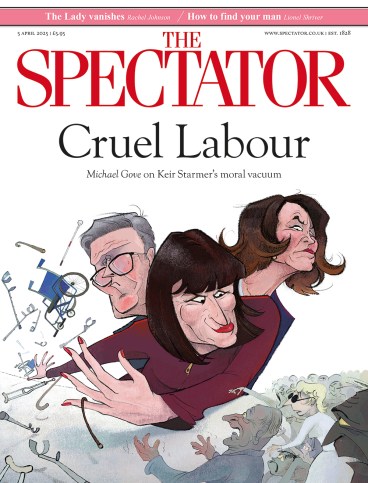
Among the most striking things about Tony Benn was his friendship with Enoch Powell. They entered the House together in 1950 and became regular presenters on The Week in Westminster before falling out over ‘rivers of blood’ and then making up. For Benn, politicians were ‘weathercocks’ or ‘signposts’, and Powell, like himself, was the latter.
This new collection of speeches and articles assembled by his daughter in the centenary of his birth, combines both the ancient history of his left-wingery and the ongoing relevance of his signposts. Melissa Benn’s intention has been to ‘lay to rest a few myths’ about her father and the left and to inspire a new generation of radicals to maintain the barricades. Regardless of whether these goals are achieved, the book unquestionably serves to remind us that ‘the most dangerous man in Britain’ (Kingsley Amis, February 1974) was one of the most thoughtful, kind, entertaining and appealing politicians of the postwar period.
The 36 short pieces give us a radical almost entirely committed to the people and their ultimate right to be collective masters of the constitution and the state. Benn’s was a quasi-Whiggish disposition which saw, from the mid-century on, that much of the British ancien régime was doomed to die and, if the struggle was won, be replaced by a more democratic, egalitarian future. (Like many prophets, he was right in part.)
That love of democracy, however, could be overridden by his desire for post–imperialism, peace and multilateralism. He opposed military action to free the Falklanders in 1982, when negotiation would almost certainly have left them occupied by a junta. He rejected the majority wishes of Ulster when, in 1987, he argued to ‘terminate British jurisdiction in Northern Ireland’. And he refused to countenance force to liberate the Kuwaitis from a dictator.
Benn re-emerges from these pages as a radical nonconformist Christian democratic socialist. The sort of thinking, perhaps, that led Hugh Gaitskell to say that he was ‘the last person in the world I would go to for advice on policy’ (though in fact Gaitskell did eventually follow Benn’s line on Suez).
Inevitably, there are absences. Benn left more than 15 million words of diary entries and was, for six decades, a speaker and writer sans fatigue. A notable absentee is his 1998 Commons speech against proportional representation which deployed his marksman’s skill:
Proportionality completely destroys the idea of representation… When Neil Kinnock was leader, I said to Neil that I had a feeling that if we have a party list system Dennis Skinner and I would be at the bottom of the list. He laughed, but in a funny sort of way… Every person whom we meet in our constituencies is our employer… and has the power to remove us.
Such humour characterised his parliamentary speeches, the rhythm and cadence of which were so regular and beautiful that a record producer, Charles Bailey, was once able effortlessly to give them an ambient groove accompaniment (‘Tony Benn’s Greatest Hits’, 2003).
Perhaps Benn’s most significant legacy has been our departure from the EU. It was under his influence that Harold Wilson agreed to hold the 1974 referendum on Common Market membership. That vote set a constitutional precedent without which 2016 may never have been. While the collection includes a markedly far-sighted article from 1981 on how Benn hoped Europe would evolve (‘fully self-governing states within a security system ultimately replacing both the Warsaw Pact and Nato’), there is no inclusion of the powerful case he often made against the undemocratic European project. Not least was a Commons speech in 1993 following Maastricht in which he said he would have to
go to the people of Chesterfield and say: ‘You can vote for whoever you like, but I must tell you honestly and frankly that if you vote for me I cannot do a thing about improving the prospects here because my party has agreed to hand over all the powers not to parliament but to an independent European bank.’
One would of course be foolish to infer any closet nationalism. Rather, Benn’s outlook represents a strand of socialism interwoven with that deep, if selective, reverence for democracy which ‘one can use… to have monetarism, socialism, liberalism or whatever’. One wonders how, today, he would have viewed the development of a European Court of Human Rights which fails more than one of his famous tests for those in power: ‘What power have you got? Where did you get it from? In whose interests do you exercise it? To whom are you accountable? How do we get rid of you?’
Conservatives will find in this fine collection much with which to disagree. But Benn himself was aware that ‘signposts’ on the other side are not always wrong. He would refer to the alliances that can form ‘round the back’ – particularly when democracy and liberty are engaged. And in that sense, he remains a beacon of a better politics.








Comments